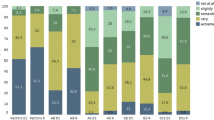Abstract
Chinese universities are undergoing a decentralization reform that academic schools take the responsibility for its own running. Under the framework of the financial management system of “Unified Leadership, Two-level Management, and Centralized Accounting,” this decentralization reform primarily targets to establish a cost accounting and settlement system for various undertakings with schools as the main body; build a multi-level economic responsibility system centered at the school; and establish and improve efficient system restraint mechanism, supervision and management mechanism, accountability mechanism, and performance evaluation mechanism. The main purpose of this study is to introduce a case of a Chinese university concentrating on this reform. The primary contents of the reform will be introduced, followed by a discussion about some responses and introspections to the reform.
Similar content being viewed by others
Data availability
The data that support the findings of this study are available from the corresponding author, upon reasonable request.
References
Birnbaum R, Edelson PJ (1989) How colleges work: the cybernetics of academic organization and leadership. Jossey-Bass, California
Bleiklie I, Enders J, Lepori B (2015) Organizations as penetrated hierarchies: environmental pressures and control in professional organizations. Organ Stud 36:873–896
Brown WO (2001) Faculty participation in university governance and the effects on university performance. J Econ Behav Organ 44:129–143. https://doi.org/10.1016/s0167-2681(00)00136-0
Bush T (2006) Theories of educational management. Int J Educ Leadersh Prep 1:1–25
Carnegie GD, Tuck J (2010) Understanding the ABC of university governance. Aust J Public Adm 69:431–441. https://doi.org/10.1111/j.1467-8500.2010.00699.x
Christensen T (2011) University governance reforms: potential problems of more autonomy? High Educ 62:503–517. https://doi.org/10.1007/s10734-010-9401-z
de Boer H, File J (2009) Higher education governance reforms across Europe. ESMU, Brussels
Eurydice (2008) Higher education governance in Europe. Policies, structures, funding and academic staff. Brussels: Eurydice, European Commission, Education and Culture DG
Hong M (2018) Public university governance in China and Australia: a comparative study. High Educ 76:717–733. https://doi.org/10.1007/s10734-018-0234-5
Hu J (2021) On the relationship between a university and its secondary institutes in the internal governance of university. Jiangsu Higher Education, 250(12): 1–6
Jacqmin J, Lefebvre M (2021) Fiscal decentralization and the performance of higher education institutions: the case of Europe. Empirica 48:743–758. https://doi.org/10.1007/s10663-020-09489-z
Jiang S (2013) Breaking through bureaucracy: the key to “de-administrative” reform of China’s universities. Jiangsu Higher Education, 167(01): 23–26
Jones W (2011) Faculty involvement in institutional governance: a literature review. J Professoriate 6:118–135
Li H (2015) The review and reflection of studies on “university administrative decentralization.” Heilongjiang Res High Educ 254:26–30
Liu X (2017) The governance in the development of public universities in China. J High Educ Policy Manag 39:266–281. https://doi.org/10.1080/1360080X.2017.1300122
Lv W, Yang J (2020) On influence factors of university-college governance strategic control and implementation. Res High Educ Eng 185:111–116
Ministry of Education of the People’s Republic of China (2010) China’s national medium and long-term educational reform and development program. http://www.moe.gov.cn/srcsite/A01/s7048/201007/t20100729_171904.html. Accessed 28 Feb 2022
Mok KH, Han X (2017) Higher education governance and policy in China: managing decentralization and transnationalism. Policy Soc 36:34–48. https://doi.org/10.1080/14494035.2017.1288964
Schoorman D, Acker-Hocevar M (2013) Faculty governance in neoliberal educational contexts: challenges for democratic decision making. Interchange 43:265–285
Van de Graaff JH (1978) Academic power. Patterns of authority in seven national systems of higher education, New York: Praeger
VanWynsberghe R, Khan S (2007) Redefining case study. Int J Qual Methods 6:80–94. https://doi.org/10.1177/160940690700600208
Xue B, Guo K, Jiang Z (2018) The dilemma and the way out of the reform of university and faculty level management system from the perspective of power change management. Meitan High Educ 36:15–18
Yang R (2020) Political culture and higher education governance in Chinese societies: some reflections academic abstract of china higher education Institutions·Education, 15(2), 35
Zhou G (2019a) The institutional logic of the two-level operation in the universities: international experience and China’s exploration. J Higher Educ 40:27–35
Zhou G (2019b) China’s logic of first-class undergraduate education. J Educ Sci Hunan Norm Univ 18:15–22
Author information
Authors and Affiliations
Contributions
The contributions of all the authors of this proposal comply with the authorship principles required by the Asia-Europe Journal.
Corresponding author
Ethics declarations
Conflict of interest
The authors declare no competing interests.
Additional information
Publisher's note
Springer Nature remains neutral with regard to jurisdictional claims in published maps and institutional affiliations.
Rights and permissions
Springer Nature or its licensor (e.g. a society or other partner) holds exclusive rights to this article under a publishing agreement with the author(s) or other rightsholder(s); author self-archiving of the accepted manuscript version of this article is solely governed by the terms of such publishing agreement and applicable law.
About this article
Cite this article
Liu, Y., Yao, X. & Xue, Y. A case study of decentralization reform in a Chinese university. Asia Eur J 21, 273–290 (2023). https://doi.org/10.1007/s10308-022-00650-w
Received:
Revised:
Accepted:
Published:
Issue Date:
DOI: https://doi.org/10.1007/s10308-022-00650-w




